Oscars Double Feature: Lady Bird & All About Eve
We have a problem with ambitious women. When women desire to be President, filmmakers and actors, CEOs, or just important by their own definition, our society views them with suspicion or condescension. But this is the era of nasty women and #MeToo, and rules are being rewritten. Greta Gerwig’s phenomenal film Lady Bird encapsulates our political climate without even directly commenting on it. When thinking of what older Best Picture winner/nominee to pair Lady Bird with, I thought of Joseph L. Mankiewicz’s All About Eve, the ultimate showbiz drama from 1950. Both films are about young women stepping out of their box. Lady Bird (Saoirse Ronan) and Eve (Anne Baxter) can be abrasive and hard to like. Lady Bird is treated with affection and understanding by the film, but Eve is a more proper villain. There’s another film to compare Lady Bird to (the wonderful Terms of Endearment), but I thought about Eve while watching Lady Bird make her mistakes.
For me, the beat in Lady Bird that first brought All About Eve to mind is Lady Bird’s weaseling her way into the cool kids group late in the film. Lady Bird, unhappy with her ordinary life, cons her way into the good graces of alpha girl Jenna (Odeya Rush). First she concocts a prank with Jenna on cooler-than-she-seems Sister Sarah Joan (Lois Smith). Then she lies about where she lives, picking her dream house in the rich part of town over her tiny home on the wrong side of the tracks. Eve tricks her way into the inner circle of megastar Margo Channing (Bette Davis) through flattery and inauthentic hero worship. The themes of class anxiety in both films see the women insinuating themselves into a false life and getting found out.
Both Lady Bird and Eve put on personas and live their lives with performative masks. Lady Bird just wants to escape her life, while Eve is more directly ambitious to be the top star. Eve wants to replace Margo, while Lady Bird just wants to join Jenna’s affluent circle. It’s easier to root for Lady Bird even though she does horrible things because she’s beautifully relatable. Lady Bird is grounded in the world that teenagers live in. All About Eve is a Broadway melodrama, with quippy characters and grand emotions. Neither Lady Bird nor Eve is a “good person,” but Lady Bird shows the potential for growth and change. Eve, by contrast, finds herself stuck in the same cycle she started. Eve is a blackmailer, and she has no qualms about sabotaging people’s lives for her own personal gain. Eve’s comeuppance isn’t even satisfying because the ending scene suggests an unbreakable pattern.
Margo Channing and Lady Bird’s mother Marion (Laurie Metcalf) share a prickly personality. They are both outwardly “difficult,” but inwardly vulnerable and sensitive. Lady Bird’s first love interest Danny (Lucas Hedges) describes Marion as “scary and warm,” which I think descries Margo as well. Both women are afraid of losing something, and are as status-conscious as their younger counterparts. Margo and Marion are both uncompromising until they are, stubborn and unforgiving but considerate and compassionate.
Lady Bird and All About Eve are both triumphs of feminist filmmaking, in similar and dissimilar ways. Both films boast a largely female cast playing fully-realized characters with interior lives. Both films easily pass the Bechdel Test in numerous scenes, with male characters revolving around the women. The key difference is that Lady Bird is written and directed by a woman, Greta Gerwig, and All About Eve by a man, Joseph Mankiewicz.
As entertaining and insightful as All About Eve is (and it is the only film to score four female Academy Award acting nominations), it still features women as catty and backstabbing, and worried about aging. Lady Bird does have women arguing with each other and pursuing romance but the film feels more authentic and honest in its depiction of women’s relationships with one another. Lady Bird and Eve are unlikable, but admirable in their headstrong pursuit of their ambitions. Eve’s hunger turns her into a villain in the 1950s, but maybe in the early 21st century, Lady Bird would identify with her going after her goals. In both films, these women want more, and we should appreciate them flaws and all.












